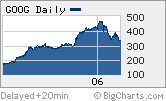Five ways for Google to get better
The search engine company needs to act like a responsible adult and do a better job of handling Wall Street.
NEW YORK (CNNMoney.com) - Google investors are having a crisis of confidence. Shares of the popular search engine company have fallen 22 percent since late January and are nearly 30 percent off their all-time high, mainly due to some high-profile gaffes. Google missed fourth-quarter earnings forecasts by a wide margin, primarily because of a higher tax rate that caught analysts off guard. Comments from the chief financial officer about slowing revenue growth at a Merrill Lynch conference spooked Wall Street. And just last week, Google (Research) disclosed in a regulatory filing that it mistakenly put up slides detailing out-of-date financial targets during its recent analyst day Web cast. "There's a fair amount of concern about how the company is going about executing on its communications with the investing public," said Scott Kessler, an equity analyst with Standard & Poor's. So what can Google do to regain the trust of analysts and investors and reverse the stock's slide? I have five suggestions. Cool it now
Some think Google's recent series of unfortunate events are due mainly to the fact that it is growing so rapidly. Of course, Google shouldn't stop investing in new long-term opportunities. But it may be a good idea to slow down and focus more on the minutiae of day-to-day operations. "The devil's in the details and when one gets to be a company of Google's size it becomes more difficult to choreograph the details," said David Garrity, an analyst with Investec U.S. Consider this. Google's head count increased by nearly 90 percent during the past year: it finished 2005 with 5,680 employees, up from 3,021 at the end of 2004. "The biggest concern with Google is that they have hired so many people. That's probably caused some problems," said one executive with an online ad agency. Watch your mouth
Google is in a tough situation. Because it refuses to give financial guidance, what little the company says about its future has an outsized effect. And the company should realize this. "Google executives need to be more adept at managing the message. Certainly there is a learning curve involved," said Garrity. The company either has to change its practice and start offering real guidance to investors or, if it chooses to stay silent about sales and earnings targets, management should not make vague comments about the future that can easily be misinterpreted. Shares have plunged almost 15 percent in the past few weeks. So the hope is that Google executives have learned their lesson. Don't be arrogant
Google enjoys a clear market lead in Web search and it doesn't seem like it will slip anytime soon. The demand for online advertising is just too strong and Web users love Google's search technology. But some advertisers are growing increasingly wary of Google since the company appears to have aspirations beyond online search. So Google may need to reassure partners that it is not really trying to take over the world -- or it could risk sending customers elsewhere. "Advertisers would like alternatives to the big guys. They don't like being beholden to just two or three companies," said David Hills, chief executive officer of LookSmart (Research), another online search firm. Hills added that if Google suffers from any more notable communication goofs, then that could cause some customers to question just how much business they want to do with Google. "If Google continues to have external missteps, their growth may slow faster than their CFO thinks it will," Hills said. "Advertisers are at once loyal and opportunistic." Get serious about fraud
Along those lines, Google has to treat its advertising customers better. Last week, Google agreed to pay $90 million to settle a class action lawsuit against the company from partners who alleged that they were being overcharged by Google due to click fraud, the practice of using illegal tactics to artificially inflate the number of times a certain ad is clicked on. That's a good start. But Nate McKelvey, chief executive of Jets International, an online booking site for private jet services, said his company has been a victim of click fraud and he fears that despite the settlement, click fraud is still a problem. (His firm is not part of the class action.) McKelvey worries that Google, Yahoo! (Research) and other search firms have not done enough to crack down on people who are committing click fraud. His concern is that people may eventually be turned off by online search if users have to wade through too many meaningless ads. "It could get to the point where there is so much garbage out there that search is useless," said McKelvey. "Google is financing an awful lot of fraudsters. If Google had a no-tolerance policy for click fraud, then that would help." Remember that shareholders are people too
Finally, Google has to come to grips with the fact it is a public company that is responsible to shareholders as well as employees and customers. Google needs to be a lot more careful in the future when making presentations to the public. Putting up a slide leaking corporate information that should have been kept private is a big no-no for any company. But it's worse for one whose reputation depends on it being a site people can trust to safeguard vast amounts of their own personal information. "The company has not adequately invested in investor relations during the past couple of years. It's pretty obvious," Kessler said. And even if Google doesn't like the Wall Street quarterly expectations game, the company still can't act as if the game doesn't exist. It bordered on reckless for CEO Eric Schmidt to declare at the analyst day that Google had a goal of becoming a $100 billion company -- and then be coy when asked to clarify it. He said it was up for analysts to decide whether or not he meant $100 billion in sales or $100 billion in market value, a level which Google has already surpassed. Now sure, there's still a lot to like about Google's fundamentals, and as long as online advertising continues to grow, there is no reason why Google shouldn't be the prime beneficiary. So in some respects, moaning about Google's recent stock slide is kind of like complaining about how Babe Ruth may have been able to hit 850 home runs instead of just 714 if he didn't drink so much beer and eat so many hot dogs. The stock, after all, is up nearly 300 percent since it went public in August 2004. But the big question for Google's management and its investors is where does the stock go next? If the company wants to make sure that its peak price is still ahead of it, Google needs to grow up and do a much better job of relaying information about itself. -- For a look at other companies that don't give guidance, click here.
Investors are searching for India's Google. Click here. |
| ||||||||||||||||||







